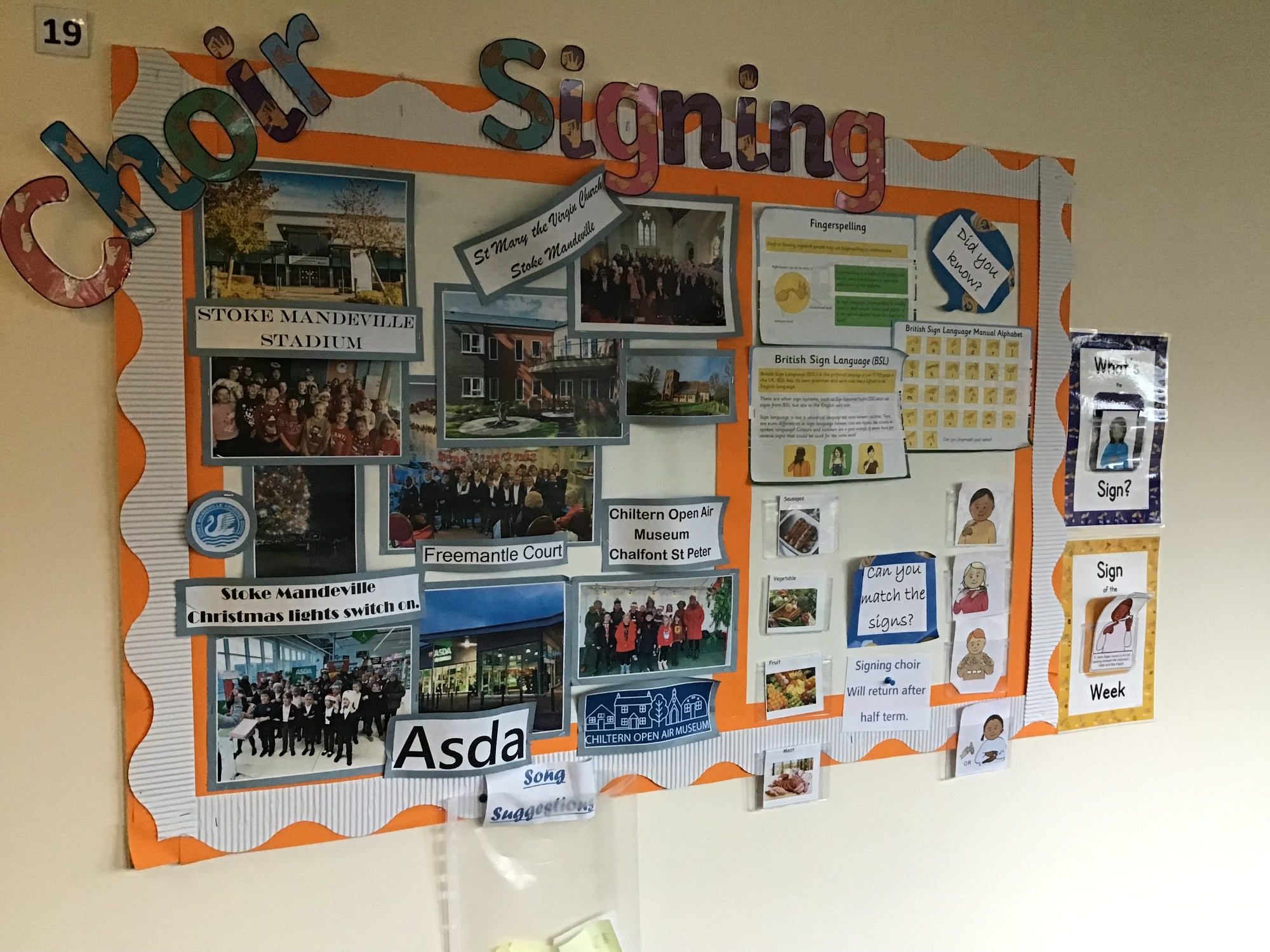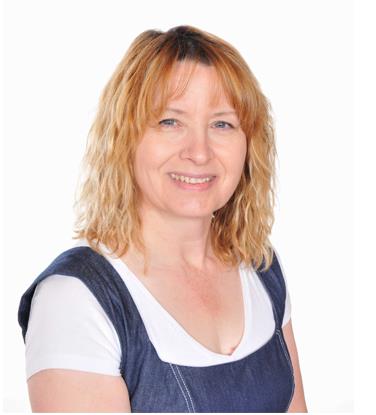Hearing Support - ARP
Welcome to Stoke Mandeville Combined School
Hearing Support Additionally Resourced Provision (HS-ARP)
We provide inclusive education for up to ten deaf pupils within the HS-ARP from Reception age to Year 6. These pupils may also have a range of communication and additional needs. We have a ‘Total Communication Approach’ which means we use and teach British Sign Language (BSL), Signed Supported English (SSE) and English, dependent on the needs of each individual pupil. We also use a range of gestures and visual resources to aid communication.
Our aim is that all deaf pupils are fully included in both the academic and social life of the school. The pupils have equal access to a broad curriculum and learn alongside their peers with in-class support or small/individual group sessions, depending upon their individual needs. This specialised support, which is specified in each pupil’s Education Health Care Plan (EHCP) is agreed and planned as a result of close working relationships with class teachers and the Teacher of the Deaf and can be delivered in-class or in a small group setting within the HS-ARP. Support and advice are given to the families of the pupils and to the mainstream staff who teach them.

In order to achieve the optimum listening environment, all of our classrooms are acoustically treated to minimise reverberation and resonance (including carpets and blinds) and are fitted with digital Soundfield Systems (surround sound amplification). This helps all the pupils in school hear the teacher and one another more clearly. A radio aid system is used in the hall for PE, assemblies and large-scale events providing equal listening access for our HS-ARP pupils.
We fully support pupils with a wide range of audiological equipment and work closely with the local audiology departments and Cochlear Implant centres. The pupils are provided with a radio aid system which provides direct input from their teacher by cutting down on background noise. The pupils are encouraged to develop independence in taking care of their listening equipment. If there are any concerns regarding pupil’s equipment, staff will inform parents and contact the relevant hospital if appropriate.

The majority of deaf pupils hear well with their hearing aids and cochlear implant processors, but need to learn to listen. Correct use and maintenance of all hearing equipment is central to our practice, as is the use of techniques to support pupils in developing good spoken language skills.
Each pupil has a daily morning check to test their equipment is working. Other checks are made throughout the day as needed. Their aids and processors are then connected to the radio aid system and further checks are made to see the listening environment is optimum for their learning. Pupils are encouraged to be independent with their equipment. They are taught how to tell an adult if there is a problem, such as a flat battery or faulty wire. As they progress through the school, they are encouraged to become more independent and supported to carry out basic troubleshooting themselves. They are encouraged to look after their aids and devices both at school and at home.

Most pupils benefit from the use of sign support or sign language. Specialised staff in our HS-ARP have relevant qualifications and experience in signing. We encourage all deaf pupils to learn BSL and have weekly one to one BSL lessons with a Deaf tutor. If appropriate, pupils can work towards gaining a sign language qualification such as BSL Level 1.

A popular lunchtime signing choir club is offered to every child in school from Year 1 upwards to enjoy singing and signing together. The choir performs at events such as Christingle, school fayres and outside school events during the year. Assemblies, concerts, performances and other whole school events are signed for equal access for all. A signed song is learnt by the whole school each half-term. We have links with BSL tutors to enable families to learn sign language together at home and connections with Young Deaf Activities (YDA), a charity which supports families with deaf children.

Visual Phonics is used as a visual aid to spoken English to enable deaf pupils to understand and identify all of the speech sounds. It also clarifies how and where speech sounds are produced. Visual Phonics is a tool to support pupil’s learning of phonics. It is used as a pathway for pupils to become skilled readers and writers, using segmenting and blending sounds together to make words. All pupils in the school are taught Visual Phonics from Reception to complement their daily phonics learning. The deaf pupils often carry on using this aid as they progress up the school.





Our deaf pupils are fully included into school life. They are supported in class by an experienced team of specialist teaching assistants in order to facilitate access to the curriculum. A Qualified Teacher of the Deaf also support the pupils, either in class or delivering 1:1 and small group teaching within the HS-ARP. The Teacher of the Deaf also teaches reverse integration groups of hearing and deaf pupils together who have similar needs. We work closely with a specialist (Deafness) Speech & Language Therapist who provides speech and language therapy twice a week.
The Teacher of the Deaf ensures that all staff at Stoke Mandeville Combined School are trained in deaf friendly teaching strategies and the use of equipment that improves the listening environment for deaf pupils. They also ensure that all members of the school community have up to date Deaf Awareness training so deaf pupils are fully included in all aspects of school life. An annual Deaf Awareness Day is held in school to promote communication and inclusion which is greatly enjoyed by all.
the listening environment for deaf pupils. They also ensure that all members of the school community have up to date Deaf Awareness training so deaf pupils are fully included in all aspects of school life. An annual Deaf Awareness Day is held in school to promote communication and inclusion which is greatly enjoyed by all.
The Teacher of the Deaf will carry out assessments with pupils to ensure that the specific needs of each pupil are identified and that the provision is appropriate. Provision of the pupils is monitored regularly to ensure that it is impactful. The Teacher of the Deaf and Specialist Teaching Assistants carry out pre-and post-teaching of subject content or new vocabulary, and deliver specific interventions according to the needs of the pupil. All sessions are either on a one to one basis or in small groups. Specialist Teaching Assistants support deaf children in the classroom in all language-based subjects, such as English, Maths, Science and Topic.
In July 2023, children from the ARP wrote a poem and then recorded themselves reciting it, with added signs. Momina created this independently and we were so proud of her we wanted to share it with you!
Meet the team:

Trainee Teacher of the Deaf

Specialist (Deafness) Teaching Assistant

Specialist (Deafness) Teaching Assistant

Specialist (Deafness) Teaching Assistant

Specialist Speech & Language Therapist (Deafness)

Deaf Tutor

 A dedicated Speech and Language Therapist with a specialism in deafness visits the HS-ARP weekly. Currently, all the deaf children are seen twice a week for short individual or paired sessions to work on the development of language skills and specific aspects of speech as outlined in their EHCP. The Teacher of the Deaf and the Speech Therapist work closely together to plan and review targets and the programmes of work.
A dedicated Speech and Language Therapist with a specialism in deafness visits the HS-ARP weekly. Currently, all the deaf children are seen twice a week for short individual or paired sessions to work on the development of language skills and specific aspects of speech as outlined in their EHCP. The Teacher of the Deaf and the Speech Therapist work closely together to plan and review targets and the programmes of work.
Transition
We invest time in ensuring smooth transitions for our deaf pupils. From first starting at school with us, to transferring onto their next school, and even as the pupils move classes each year.
A programme of visits together with liaison between staff, ensures a smooth transfer and the opportunity to allay fears and worries that pupils and families may have. Close liaison and collaboration with schools enables our pupils to follow the pathway with smooth transitions between phases.
Monitoring Progress
Once a term a Multi-Agency Provision Plan (MAPP) is drawn up with individual targets decided on by all professionals working with the pupil. These are short term targets based on the pupil’s EHCP. Parents are encouraged to meet with HS-ARP staff to discuss these targets. Targets are reviewed half termly or termly, as appropriate. HS-ARP pupils have an Annual Review each year with all professionals concerned with the education and care for the pupil to review progress and monitor the outcomes of the EHCP. Communication between parents and the Teacher of the Deaf is highly valued to ensure pupils are making continual progress.
Parents attend school parent consultation meetings held twice a year and also receive a yearly school report showing their child’s progress and development. The HS-ARP uses a Home School Communication book as a link between home and school for day to day informal messages. Parents can also contact the school at any point if they wish to speak to the Teacher of the Deaf about their child or have any worries or concerns.

We believe that trips and extra-curricular activities are extremely important in developing the pupils’ social, emotional well-being and awareness of the environment. Deaf pupils join their classmates on class trips and visits and we also have HS-ARP trips such as museum visits or walks in the local area. We take part in SEN and Deaf sporting events such as The SEN Games, Boccia, curling and bowling. We have won medals and trophies at the Panathlon Sporting Events against other local schools. At Christmas we attend Gulliver’s Land Theme Park as part of a Variety Club Trip. We have had the NDCS Listening Bus and other deaf visitors such as musicians and sports people visit our school who provide good Deaf role models. We encourage families to be part of the Young Deaf Activities (YDA) which organises events for families in the local area.
If you would like more information about the HS-ARP at SMCS, please do not hesitate to get in touch with us:
Email: office@smcs.org.uk
Telephone: 01296 612371
